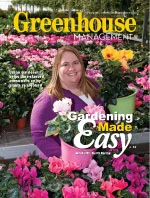|
 We all know the litany by now — gardeners are getting older and the young adults don’t seem interested. Housing construction and homeownership, with their pull-through influence on our products, will most likely not follow the same patterns as they have in the past. Consolidations in the supply chain will certainly have an effect. Where do we start to recover our place as the No. 1 leisure pastime in America? We all know the litany by now — gardeners are getting older and the young adults don’t seem interested. Housing construction and homeownership, with their pull-through influence on our products, will most likely not follow the same patterns as they have in the past. Consolidations in the supply chain will certainly have an effect. Where do we start to recover our place as the No. 1 leisure pastime in America?
Consumers are looking for value for their money — and it’s our job to help them see that in our products. Our products are perishable, and at a time when consumers are more risk-averse than ever, trust in the quality of our products and information is paramount.
There has been an explosion in branding over the last decade. Companies who put a lot of effort and money into breeding and advertising need a way to make their products stand out to justify, and make a profit on, the expense. And they sometimes come up with some pretty cool stuff.
In the pursuit of image, however, it’s important to remember the role of substance. Overmarketing, or creating impossibly unrealistic expectations, can do way more harm than good.
If our wary customers are depending on us for reliable information, it’s more important than ever that we don’t mislead them. At our place, we’ve always found it best to try to deliver a little more than we promise.
Gardening, like politics, is local. The regional approach is key. Gardening consumers need to be confident that the plants they are buying have a decent chance of thriving in their area — or at least be aware if they won’t. The Athens Select program, state plant programs and the trial gardens conducted at various universities and botanical gardens emphasize plant performance on a regional scale. (Many of these programs are facing funding crises. Make a donation and support their efforts.)
However, many of the container and mixed-basket recipes in the national brand ads would struggle to succeed for very long in some parts of the country. Regionally appropriate recipes would go a long way toward building gardening trust and confidence. And don’t get me going on tags — everyone knows that there’s not an impatiens on the planet that stays just 8-10 inches tall in Birmingham, Ala. — but that’s what’s printed on the tags. And many gardening consumers pay attention to that information. It’s hard to believe there’s no way to fix that.
To keep our current customers and develop more, we need to distribute accurate information and resist the temptation to hoodwink the gardening consumer in pursuit of sales.
Our products have an amazingly positive influence on people and places. Let’s give consumers the information they need, in a language they can understand. Their success is our future.
Carole Barton is co-owner, Barton’s Greenhouse & Nursery, www.bartonsgreenhouse.com.
|

 We all know the litany by now — gardeners are getting older and the young adults don’t seem interested. Housing construction and homeownership, with their pull-through influence on our products, will most likely not follow the same patterns as they have in the past. Consolidations in the supply chain will certainly have an effect. Where do we start to recover our place as the No. 1 leisure pastime in America?
We all know the litany by now — gardeners are getting older and the young adults don’t seem interested. Housing construction and homeownership, with their pull-through influence on our products, will most likely not follow the same patterns as they have in the past. Consolidations in the supply chain will certainly have an effect. Where do we start to recover our place as the No. 1 leisure pastime in America?




